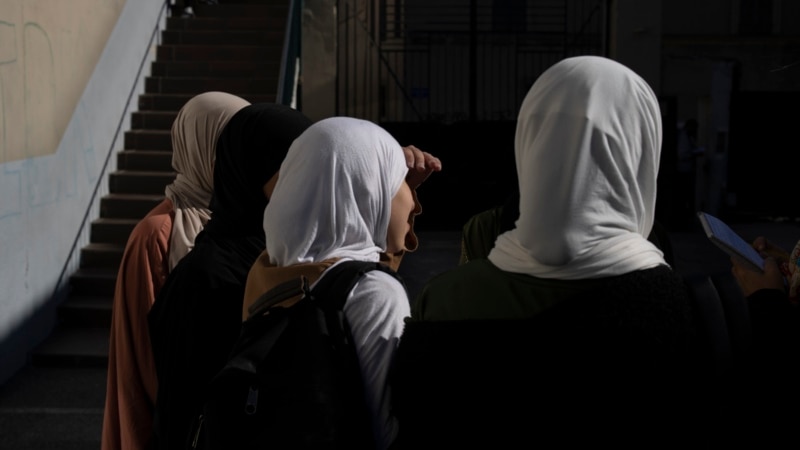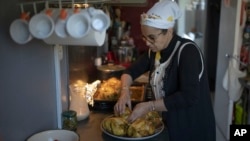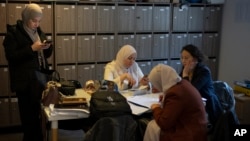This website uses cookies so that we can provide you with the best user experience possible. Cookie information is stored in your browser and performs functions such as recognising you when you return to our website and helping our team to understand which sections of the website you find most interesting and useful.
 MARSEILLE, France —
MARSEILLE, France —
Brought into the international spotlight by the ban on hijabs for French athletes at the upcoming Paris Olympics, France's unique approach to "laïcité" — loosely translated as "secularism" — has been increasingly stirring controversy across the country.
The struggle cuts to the core of how France approaches not only the place of religion in public life, but also the integration of its mostly immigrant-origin Muslim population, Western Europe's largest.
Perhaps the most contested ground is public schools, where visible signs of faith are barred under policies seeking to foster national unity. That includes the headscarves some Muslim women want to wear for piety and modesty, even as others fight them as a symbol of oppression.
"It has become a privilege to be allowed to practice our religion," said Majda Ould Ibbat, who was considering leaving Marseille, France's second-largest city, until she discovered a private Muslim school, Ibn Khaldoun, where her children could both freely live their faith and flourish academically.
"We wanted them to have a great education, and with our principles and our values," added Ould Ibbat, who only started wearing a headscarf recently, while her teen daughter, Minane, hasn't felt ready to.
For Minane, as for many French Muslim youth, navigating French culture and her spiritual identity is getting harder. The 19-year-old nursing student has heard people say even on the streets of multicultural Marseille that there's no place for Muslims.
"I ask myself if Islam is accepted in France," she said.
Minane also lives with the collective trauma that has scarred much of France in the aftermath of Islamist attacks, which have targeted schools and are seen by many as evidence that laïcité (pronounced lah-eee-see-tay) needs to be strictly enforced to prevent radicalization.
Minane vividly remembers observing a moment of silence at Ibn Khaldoun in honor of Samuel Paty, a public school teacher beheaded by a radicalized Islamist in 2020. A memorial to Paty as a defender of France's values hangs in the entrance of the Education Ministry in Paris.
For its officials and most educators, secularism is essential. They say it encourages a sense of belonging to a united French identity and prevents those who are less or not religiously observant from feeling pressured.
For many French Muslims, however, laïcité is exerting precisely that kind of discriminatory pressure on already disadvantaged minorities.
Amid the tension, there's broad agreement that polarization is skyrocketing, as crackdowns and challenges mount.
"Laws on laïcité protect and allow for coexistence — which is less and less easy," said Isabelle Tretola, principal of the public primary school across from Ibn Khaldoun.
She addresses challenges to secularism daily — like children in choir class who put their hands on their ears "because their families told them singing variety songs isn't good."
"You can't force them to sing, but teachers tell them they can't cover their ears out of respect for the instructor and classmates," Tretola said. "In school, you come to learn the values of the republic."
Secularism is a fundamental value in France's constitution. The state explicitly charges public schools with instilling those values in children, while allowing private schools to offer religious instruction as long as they also teach the general curriculum that the government establishes.
Government officials argue the prohibition against showcasing a particular faith is necessary to avoid threats to democracy. The government has made fighting radical Islam a priority, and secularism is seen as a bulwark against the feared growth of religious influence on daily life, down to beachwear.
"In a public school, the school for everyone, one behaves like everyone else, and should not make a display," said Alain Seksig, secretary general of the Education Ministry's council on secularism.
For many teachers and principals, having strict government rules is helping confront multiplying challenges.
Some 40% of teachers report self-censoring on subjects from evolution to sexual health after the attacks on Paty and another teacher, Dominique Bernard, slain last fall by a suspected Islamic extremist, said Didier Georges of SNPDEN-UNSA, a union representing more than half of France's principals.
Like him, Laurent Le Drezen, a principal and a leader of another education workers union, SGEN-CFDT, sees a nefarious influence of social media in the growth of Muslim students challenging secularism at school.
His classroom experience in Marseille's Quartiers Nord — often dilapidated suburbs with projects housing mostly families of North African origin — also taught him the importance of showing students that schools aren't coming after them for being Muslim.
At Marseille's Cedres Mosque, next to the projects, Salah Bariki said youth are struggling with exactly that sense of rejection from France.
"What do they want us to do, look at the Eiffel Tower instead of Mecca?" Bariki quipped. Nine of 10 young women in the neighborhood are now veiled, "for identity more than religion," he added.
To avoid a vicious cycle, more — not less — discussion of religion should be happening in schools, argued Haïm Bendao, rabbi at a conservative synagogue in a nearby neighborhood.
"To establish peace, it's a daily effort. It's crazy important to speak in schools," said Bendao, who has gone to both Ibn Khaldoun and the Catholic school across from it, Saint-Joseph, which also enrolls many Muslim students.
Several families at Ibn Khaldoun said they chose it because it can support both identities instead of exacerbating all-too-public doubts over whether being Muslim is compatible with being French.
"When I hear the debate over compatibility, that's when I turn off the TV. Fear has invaded the world," said Nancy Chihane, president of the parents' association at Ibn Khaldoun.
At a recent spring recess where girls with hijabs, others with their hair flowing in the wind, and boys all mingled, one headscarf-wearing high-schooler said transferring to Ibn Khaldoun meant both freedom and community.
"Here we all understand each other, we're not marginalized," said Asmaa Abdelah, 17.
Nouali Yacine, her history and geography teacher, was born in Algeria — which was under French colonial rule until it won independence in 1962 after a violent struggle — and raised in France since he was 7 months old.
"We are within the citizenry. We don't pose that question, but they pose it to us," Yacine says.
The school's founding director, Mohsen Ngazou, is equally adamant about respecting religious and education obligations.
He recalls once "making a scene" when he saw a student wearing an abaya over pajamas — the student code prohibits the latter alongside shorts and revealing necklines.
"I told her she wasn't ready for class," Ngazou said. "The abaya doesn't make a woman religious. The important thing is to feel good about who you are."



 Africana55 Radio
Africana55 Radio 


